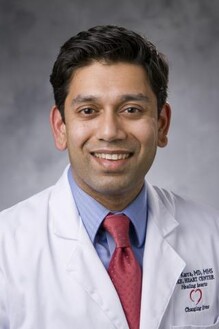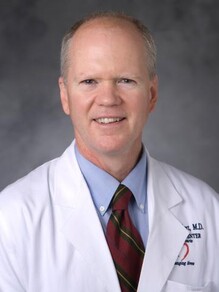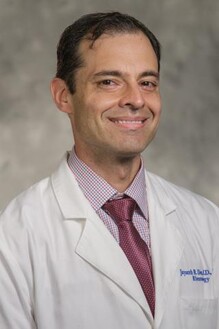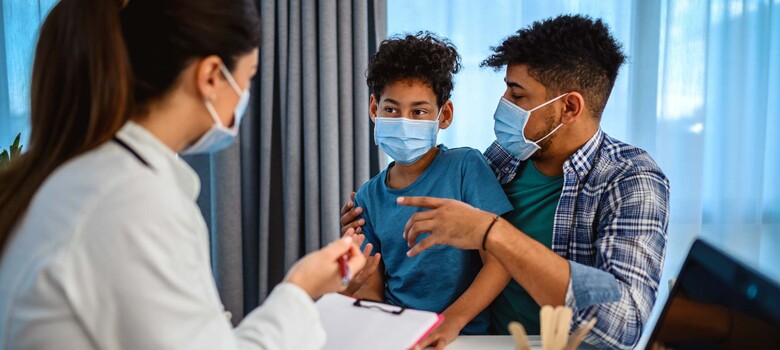Sports Performance Coach Takes the Lead Against Sarcoidosis Thanks to Expert Care at Duke

William Stephens stands in Duke University’s basketball weight room where he trains Blue Devils players.
In Fall 2019, William Stephens learned he had cardiac sarcoidosis, a rare autoimmune disease that causes inflammation in the heart. A team of Duke doctors helped Stephens continue to work as a sports performance coach for Duke basketball players. Years later, he experienced a life-threatening sarcoidosis “flare” that sent him to the emergency department. Duke sarcoidosis experts stabilized Stephens quickly and established a more aggressive treatment regimen. Today, his sarcoidosis is in full remission, and the 58-year-old is happy to feel better. “This disease will kill you if you don't get on top of it,” Stephens said. “I’m very blessed.”
Something’s Not Right
William Stephens prioritized health from a young age. After spending more than a decade in law enforcement, winning a handful of high-profile powerlifting championships, and becoming a certified strength and conditioning specialist, Stephens joined Duke basketball in 1998. He prioritized living a healthy lifestyle at home and at work so when he started noticing fatigue and chest pressure in the summer of 2019, he knew something wasn’t right.
Cardiac Sarcoidosis Diagnosis
Stephens’ primary care doctors ordered a battery of tests, which showed his heart rate was dangerously low and inconsistent, and imaging scans showed scarring on his heart. Both signs indicated Stephens could have sarcoidosis. Its cause unknown, sarcoidosis encourages the immune system to form clumps of inflammatory cells that can attack organs including the heart (doctors call this cardiac sarcoidosis). Common sarcoidosis risk factors include age (between 20 and 60 years old) and African American descent, both of which applied to Stephens.
Recognized Sarcoidosis Clinic
Stephens’ doctors referred him to Duke’s Sarcoidosis Clinic, which is recognized by international organizations like the World Association for Sarcoidosis and Other Granulomatous Disorders (WASOG). The clinic’s specially trained providers work together to treat people with sarcoidosis and related complications. Stephens met advanced heart failure specialist Ravi Karra, MD; electrophysiologist James Daubert, MD; and rheumatologist Jayanth Doss, MD.
“Our multidisciplinary providers have expertise in different areas of sarcoidosis, and we work as a team,” Dr. Karra said. He likened it to legendary Duke men’s basketball Coach Mike Krzyzewski’s well-known teamwork analogy: a fist is much more powerful than five individual fingers.
Treatment Plan Includes Heart Device
To address Stephens’ immune response, decreased heart function, and heart rhythm issues, Drs. Karra, Daubert, and Doss recommended medications as well as a combination pacemaker/implantable cardioverter defibrillator (ICD).
“I'll never forget that phone call when Dr. Daubert told me I had to get a pacemaker. It was a shock,” Stephens said. “Your mind goes a lot of places when someone says, ‘You need something to help your heart do what it's supposed to do.’ That was hard to digest.”
A Dangerous Flare
Stephens’ pacemaker/ICD was surgically implanted in October 2019. He felt better, returned to work, and had regular check-ups with his doctors. In Spring 2022, Stephens was driving by Duke University Hospital when he felt like someone hit his car from behind. When it happened again, he realized he was being shocked by his ICD. That meant his heart was in a dangerous rhythm. He called his Duke care team, who immediately sent him to the emergency room. “By the time I got to the ER, they took me right back and got everything under control,” Stephens said.
According to Dr. Karra, Stephens was experiencing unstable ventricular tachycardia, a dangerous arrhythmia, or irregular heartbeat that doctors call a “VT storm.” PET scans showed increased inflammation in Stephens’ heart, indicating a sarcoidosis flare -- a sudden worsening of an otherwise stable condition. His doctors recommended more aggressive treatment with a different combination of medications. Quick, expert treatment at Duke probably saved his life that day, Stephens said. Four days later, he returned home.
Looking Forward
Since then, follow-up PET scans show no evidence of sarcoidosis activity. Stephens is now in his 26th year with Duke athletics and said he’s grateful for how in-tune Duke providers are with their patients.
“We are a very patient-centered program,” Dr. Karra said. “And for Mr. Stephens, we considered things very carefully. What does it mean for him to go back to work? How can he be productive in his role and his job? We want to help people not only prolong their lives but also to enjoy it and have fulfilling experiences.”
Dr. Karra emphasized that Duke can offer the full range of sarcoidosis treatment options, including heart and other organ transplants for the most severe cases. “We can help people at all stages of their disease, including very complex sarcoidosis that's no longer responding to treatment,” he said. “That's not true anywhere else in North Carolina.”





